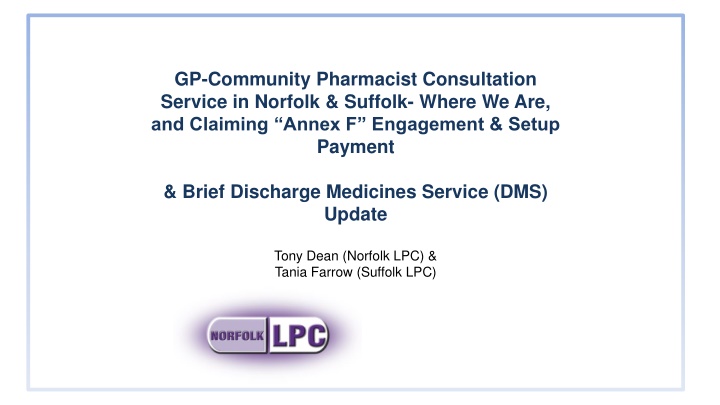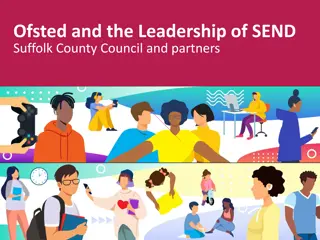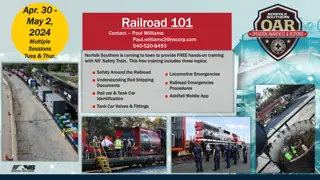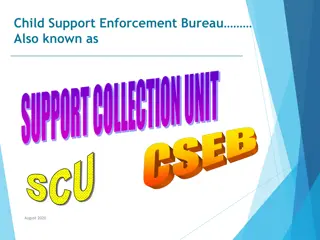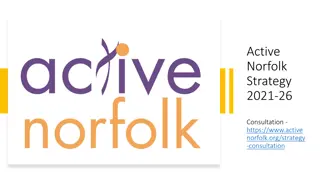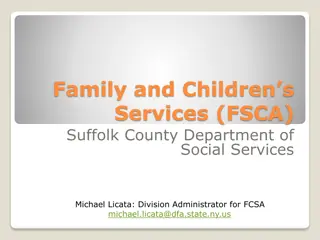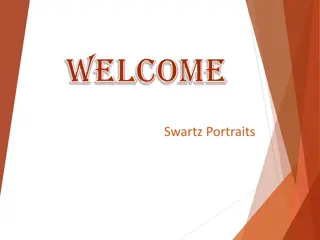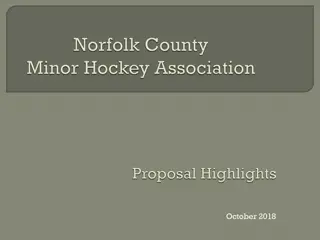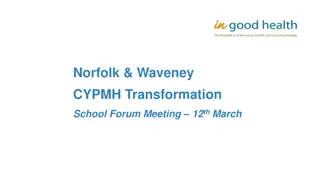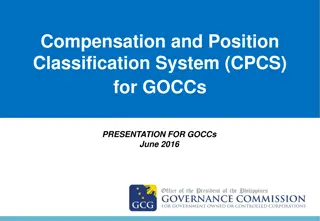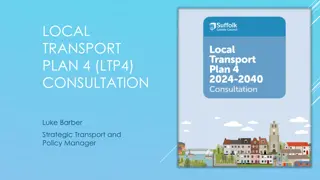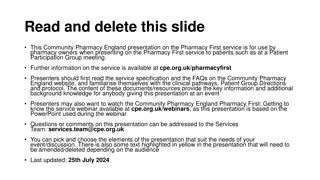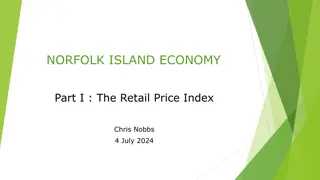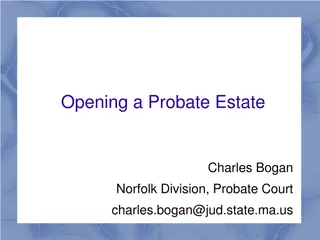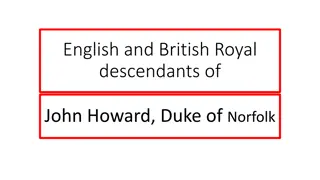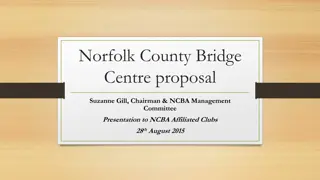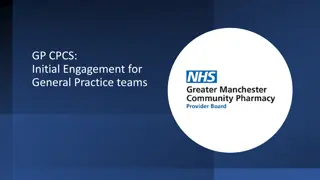GP-CPCS Consultation Service Overview in Norfolk & Suffolk
Gain insights into the GP-CPCS service rollout in Norfolk & Waveney, East and West Suffolk. Understand Annex F payment claiming, criteria fulfillment, evidence collection, and available resources. Discover the benefits of GP-CPCS, referral pathways, and the role of community pharmacists in addressing low acuity conditions, minor illnesses, and patient care. Learn about payment structures and the seamless integration between GPs, NHS 111, and community pharmacies for enhanced patient outcomes.
Download Presentation

Please find below an Image/Link to download the presentation.
The content on the website is provided AS IS for your information and personal use only. It may not be sold, licensed, or shared on other websites without obtaining consent from the author.If you encounter any issues during the download, it is possible that the publisher has removed the file from their server.
You are allowed to download the files provided on this website for personal or commercial use, subject to the condition that they are used lawfully. All files are the property of their respective owners.
The content on the website is provided AS IS for your information and personal use only. It may not be sold, licensed, or shared on other websites without obtaining consent from the author.
E N D
Presentation Transcript
GP-Community Pharmacist Consultation Service in Norfolk & Suffolk- Where We Are, and Claiming Annex F Engagement & Setup Payment & Brief Discharge Medicines Service (DMS) Update Tony Dean (Norfolk LPC) & Tania Farrow (Suffolk LPC)
This Evening Will Cover: What is GP-CPCS?- brief overview of the service Update on Rollout of GP-CPCS in Norfolk & Waveney, and East and West Suffolk Claiming Annex F payment: Discussion around the actions required to meet the Annex F criteria Discussion around collecting evidence that you are meeting the criteria Information on the resources available to support both your set up fee and service roll out. Discharge Medicines Service- update and actions
What IS GP-CPCS? Why its a leap forward compared to informal care navigation An extension of existing CPCS No need to sign up if you re already providing 111-CPCS (all but 3 Norfolk, and all but 10 Suffolk pharmacies are) Referral from GP Practice of patients with Low Acuity Conditions NO GP referral for urgent supply, unlike 111 CPCS Formalises current variable care navigation pathways and provides an audit of the value of community pharmacist led interventions. Crucially it requires: Agreed escalation pathway back to general practice a Post-event message to be sent back to practice, closing the loop and Improving Governance. Payment to provide the service ( 14 per consultation)
CPCS NHS 111 & GP referral pathways for low acuity, minor illness Patient calls NHS 111 or IUC CAS with a minor illness The call may be transferred to a clinician or handled by a call advisor (non-clinical) Patient calls or attends their GP surgery with a minor illness Patient triaged to a nominated community pharmacy Patient referred to a nominated community pharmacy Message sent to community pharmacy electronically (IT system or NHS mail)
Patient doesnt contact the pharmacy? Pharmacy attempts to contact patient using details provided in the referral Patient telephones the pharmacy or attends in person Pharmacy hasn t received a referral Pharmacy checks IT system and NHS mail then contacts 111 or GP Pharmacist Consults with patient, ESCALATION PATHWAY checks NICE CKS and gives appropriate advice around self care and prevention Pharmacist calls NHS 111 (or out of hours provider) Support patient to make appointment with GP Patient does not require medication, Self care advice is sufficient Patient requires OTC/PGD medication and self care advice Patient Patient requires referral to locally commissioned service requires higher acuity care - escalate Call 999 if urgent Product is supplied from local PGD Patient can purchase an OTC product Post event message to GP via IT system or NHS mail Pharmacist completes the NHS CPCS IT system consultation Supplies and relevant information leaflets and advises If symptoms do not improve or become worse, then either come back to see me or seek advice from your GP
List of possible symptoms groups identified for referral to a community pharmacist (from Annex D of CPCS service specification) This list is not exhaustive but reflects the expected case mix based on current NHS 111 calls Acne, Spots and Pimples Allergic Reaction Ankle or Foot Pain or Swelling Athlete's Foot Bites or Stings, Insect or Spider Blisters Constipation Cough Cold and Flu Diarrhoea Ear Discharge or Ear Wax Earache Eye, Red or Irritable Eye, Sticky or Watery Eyelid Problems Hair loss Headache Hearing Problems or Blocked Ear Hip, Thigh or Buttock Pain or Swelling/Itch Knee or Lower Leg Pain Lower Back Pain Lower Limb Pain or Swelling Mouth Ulcers Nasal Congestion Rectal Pain, Scabies Shoulder Pain Skin, Rash Sleep Difficulties Sore Throat Tiredness Toe Pain or Swelling Vaginal Discharge Vaginal Itch or Soreness Vomiting Wound Problems - management of dressings Wrist, Hand or Finger Pain or Swelling
Where are we in Norfolk & Suffolk? Start of National service 1st November 2020 Regional NHSE&I teams to facilitate rollout for 6 months only by use of very limited support funding via Midlands & Lancs CSU Political drive to launch but with all other pressures recognised that launch will be soft ( lumpy ). For first 2-3 months looking to secure system engagement/planning/ownership and A few early adopter sites (practices or PCNs) initially Covid pressures, and the necessary focus on vaccination, are significantly affecting progress- but after tonight you are still able to claim Annex F payment!
The Picture in Norfolk & Waveney Fortunate in System Ownership of GP-CPCS STP Working Group meeting weekly, comprised of: CCG MO Lead, LPC, LMC, CCG IT and GP Prescribing Lead A number of (group) practices identified for early adoption. Initial criteria preferred surgery sites working with 1-3 regular pharmacies, but next wave plan includes a Norwich practice Meetings held with Practice Managers etc. Pathways agreed- NHS mail referralusing Ardens templates Patient will ring pharmacy first. If patient doesn t then pharmacy to attempt to contact patient. PharmOutcomes platform use in pharmacies for data recording and feedback to practice if required, escalation pathway back to practice will be via practice back office number LPC-commissioned VirtualOutcomes training for practices approved Next steps: Agree Go Live dates, communicate with affected pharmacies, practice training, LPC-facilitated communications. Small delay due to initial C-19 vaccination pressures GP-CPCS included in IPMO Strategy , with KPIs and PGD development Despite all the above, extensive rollout will take time.
The Picture in Suffolk (ex.Waveney) System Ownership of GP-CPCS in principle but implementation being overridden by other priorities. ICS Working Group now established to include CCG MO Leads, LPC, GP prescribing lead and GP IT. A number of practices identified for early adoption. Initial criteria preferred surgery sites working with 1-3 regular pharmacies Pathways agreed- NHS mail referral using agreed template in GP system. PharmOutcomes platform use in pharmacies for data recording and feedback to practice if required. LPC-commissioned VirtualOutcomes training available for practices and pharmacies. Next steps: Regular meeting of an East and West Suffolk working group. Extensive rollout will take time.
Engagement and Set Up Payment 300 engagement and set up payment actions can now be completed up to 30th June 2021, and claimed on MYS by 5th July 2021. Extension helpful but this webinar still allows claim, so why not do so asap? We cannot guarantee further LPC webinars at this stage, though we will discuss Go Lives with all affected pharmacies at the time. Some have claimed already! Unlikely to stand up to Post Payment Verification. The rest of this webinar supports you to collect the evidence you will need. Claim via MYS All contractors are asked to attend one of three webinars to ensure they meet the discussion element of the Annex F requirement. However it is understood that this will not be possible for some contractors so briefing materials will be available via the LPC websites.
Annex F in Detail a)The contractor has participated in discussions with a delivery partner/LPC lead to explore how they might promote uptake of CPCS locally. This could include early exploration of options, through to discussing the planning process for rollout of the referral pathway. Tonight s webinar provides this Q: Could/should Pharmacies be discussing GP-CPCS with their practices? A: Not mandated, but by all means if an opportunity arises. However, please: Bear in mind current pressures/priorities Avoid multiple approaches to same practice LPC/System team must be informed to ensure adequate support Cannot just be an arrangement between a practice and a pharmacy that excludes others - patient free choice must prevail Suggest if there s any interest just pass information to LPC for inclusion in planning. Please liaise with LPC on approaches esp. any social media
Annex F in Detail Continued b) The contractor has participated in meetings, which may be web-based and organised by others, to brief pharmacies and potentially general practices on the referral process which will be implemented, including how pharmacies will be involved in the pathway. Where a contractor has no representative available to attend a meeting at the time set, they should instead seek a briefing from the delivery partner/LPC lead on the matters discussed to ensure that they remain fully engaged with local plans. Tonight covers this for now We have discussed the agreed pathways: NHS mail for referral, patient to ring first, PharmOutcomes for data capture and feedback, surgery back office number for escalation pathway back for urgent appointment. These may change by the time your area goes live, but this initial agreement is enough for Annex F. Presentation will be on LPC websites, which will then act as the above briefing for anyone not attending. Monitor LPC website for developments as local roll out progresses
Annex F in Detail Cont c) The contractor must ensure that relevant members of the pharmacy team have read and understood any briefing materials prepared locally by the PCN or delivery partners on the referral pathway and any rollout plans, to ensure the relevant details are understood; Record of staff briefing based on tonight's update (see Plan on a Page and template Staff Briefing Record on your LPC website) d) The contractor should create an action plan for implementing the new referral pathway in the pharmacy, including ensuring their NHS CPCS standard operating procedure is updated to include the GP referral pathway and the associated record keeping and data capture requirements. Create a pharmacy specific briefaction plan based on tonight s update which includes the need to update your SOP before implementation.
Annex F in Detail Cont e) The contractor must ensure that relevant members of the pharmacy team are fully briefed and have read and understood information within the updated NHS CPCS service specification and associated toolkit which is pertinent to their role. Record of staff briefing (see template Staff Briefing Record on your LPC website) Service Specification & Toolkit (see links at the bottom of the NHSBSA website accessed below) https://www.nhsbsa.nhs.uk/pharmacies-gp-practices-and-appliance- contractors/dispensing-contractors-information/nhs-community-pharmacist- consultation-service-minor-illness-and-urgent-repeat-medicines-supply Other Resources Materials to promote GP-CPCS include infographic and animation: https://psnc.org.uk/services-commissioning/advanced-services/community- pharmacist-consultation-service/cpcs-gp-referral-pathway/
Group Discussion Please use the webinar chat function on the control panel to type your questions and/or observations.
Discharge Medicines Service The Discharge Medicines Service (DMS) becomes a new Essential Service within the Community Pharmacy Contractual Framework (CPCF) from 15th February 2021. This service: Formalises TCAM/EMOP pathways into a funded national referral service from Trusts to pharmacies for patients who it is deemed would benefit from extra guidance e.g. around newly prescribed or changes to medication. The aims are to: Optimise the use of medicines, whilst facilitating shared decision making; Reduce harm from medicines at transfers of care; Improve patients understanding of their medicines and how to take them following discharge from hospital; Reduce hospital readmissions; and Support the development of effective team-working across hospital, community and primary care networks pharmacy teams and general practice teams and provide clarity about respective roles.
Discharge Medicines Service Is a 3 stage service, with actions required as specified at each stage: 1) On receipt of the discharge referral from the Trust (here via PharmOutcomes) 2) When the first prescription is received by the pharmacy following discharge (think how to flag this on PMR?) 3) Check patient s understanding of their medication regimen FUNDING 400 set up fee, paid automatically to all pharmacies on 1st April 2021 Full service fee (all 3 parts completed) 35. Partial payment for each stage only if you can genuinely not complete in full. Details in Drug Tariff and guidance
Getting ready for the Discharge Medicines Service ALL relevant staff must be trained and aware and as a minimum: 1.Read the section on DMS within the NHSE&I guidance on the regulations; and 2.Read the DMS toolkit. 3. It is recommended that they also complete the CPPE NHS Discharge Medicines Service eLearning and assessment. Remember this is an essential service https://psnc.org.uk/services-commissioning/essential-services/discharge-medicines-service/
Getting ready for the Discharge Medicines Service Once a pharmacist or pharmacy technician has undertaken appropriate learning related to the service, they must complete the DMS Declaration of Competence and provide a copy of that to the pharmacy contractor. Other members of staff that will play a part in supporting provision of the service should be briefed on the service, with appropriate training provided. DMS briefing for pharmacy teams Contractors must have a Standard Operating Procedure (SOP) for the service. The National Pharmacy Association have developed a template DMS SOP for their members. Download a copy of the DMS Contractor checklist Remember this is an essential service https://psnc.org.uk/services-commissioning/essential-services/discharge-medicines-service/
What is happening in Norfolk & Suffolk? Will I receive referrals soon? Trusts already live for EMOP (ALL acute hospitals apart from QEH King s Lynn) will transfer to referring via DMS after 15th Feb. Current referral rates variable (some C-19 effect) but discussions underway to agree priorities for referral which should increase numbers Service describes the need to agree links with surgeries/PCN for dealing with queries and to integrate the service into care pathways. By all means discuss with surgeries/PCN pharmacists if opportunity presents, you should have some existing process for EMOP/general script queries that can be gradually developed. LPCs working with EAHSN and local ICS/STP systems on the above. Expectation that system working groups will very soon be set up to look at referrals, integration within PCNs/practices and also other Trust sites (community/mental health trusts) in due course. In West Norfolk, QEH anticipated to go live with DMS by April 2021. This launch will be locally supported and communicated by the LPC.
So, exactly where are we with what we see and should DO in pharmacies? (16th Feb 2021)? Existing EMOP referrals should now be treated as DMS PharmOutcomes in-pharmacy template for DMS is now available and linked to local referrals. Discharge Medicines Service community pharmacy follow-up - https://media.pharmoutcomes.org/video.php?name=DischargeMedicinesServiceManagingD MSReferrals There is currently no automatic claim function so monthly claims should be made manually via MYS until this functionality is added. DMS Worksheet available under Resources at: https://psnc.org.uk/services- commissioning/essential-services/discharge-medicines-service/
Any Questions on DMS? Please use Chat function or raise your hand
Thank You For Attending This Webinar If you have any further queries after the session ends please email your LPC info@norfolkpharmacies.co.uk info@suffolklpc.org.uk
